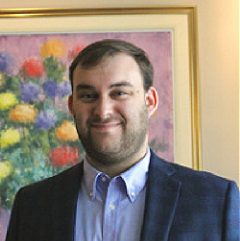Zachary Savelson,
PhD in Cognitive Science at Carleton University
Area of Study / Concentration: Educational Psychology
Citation in APA format:
O’Connor, R., Savelson, Z., Gattas, S., Gunning, S., Hawes, Z., Howard, S., Scerif, G. & Merkley, R. (2022, July 21-23). Measuring Changes in Educator Knowledge in a Professional Development Intervention [Poster Presentation]. IMBES Conference, Montreal, QC, Canada. https://imbes.org/
Plain language abstract:
In educational interventions with a professional development (PD) component, educator knowledge change is likely to be a contributing factor to intervention success. Despite this, relatively few early years interventions have successfully attempted to measure knowledge development. In this poster, an innovative method of using mind maps to collect quantitative and qualitative data on knowledge before and after PD sessions within the case study of a combined executive function and mathematical intervention for pre-schoolers is used. The data demonstrates that this may be an effective way of measuring knowledge development, but should be supplemented with questionnaires and interviews to help our understanding of any changes.
Is this part of a larger project?
Yes – the ONE programme (collaboration with University of Oxford, UK)
Was it for a class or part of your Honours/M.Cog./Ph.D. Thesis??
No
How was this project funded (if applicable)
The ONE programme – funded by Nuffield (through University of Oxford)
Was this research conducted with researchers external to Carleton?
Yes
Where are they from? (Affiliation/Country)/What is their area of expertise?
The University of Oxford, UK; Expertise: early numeracy skills and executive functions (Developmental Psychology)
How did this collaboration come about?
Carleton Cognitive Science Professor Rebecca Merkley’s links to the University of Oxford
Were there challenges to conducting this research/writing this paper?
Given that educators may have limited prior knowledge on topics such as executive functions, careful consideration and piloting was required to design low-pressure, informal measures that accurately capture change. An additional challenge is that we collected data at the preschool level rather than at the practitioner level. This reduces the power of any analysis and limits our ability to relate knowledge development to individual differences in practitioners.
How was data collected for this project? (if applicable)
Using questionnaires and interviews as part of the professional development component of a larger intervention project
How was data analyzed for this project? (if applicable)
Given the small dataset and qualitative nature of the data, inferential statistics were not used. For each type of mind map, the number of spokes were counted and categorised as either “accurate”, “semi-accurate” or “inaccurate”. Means were calculated for each category at T1 and T2 and a bar chart was produced (in R?) to visualise this data.
Where did you present your work?
International mind, brain and education society (IMBES) conference, July 2022
Why did you choose this conference/colloquium/symposium?
Our work is applicable to both cognitive scientists and educators. IMBES provided an ideal opportunity to reach both target audiences.
Was your work presented as a poster and/or talk?
How would you describe your overall experience presenting your work at this conference?
Presenting this work was a great experience! It was a good opportunity to share our work with researchers studying similar areas and getting their perspective on the intervention.
Were there any challenges in presenting your work?
Mixed cognitive science and education crowd – difficult to gauge the most appropriate level for explanations to avoid causing confusion on the one hand or being patronising on the other. Two co-authors with different areas of focus meant that we were not experts in each other’s fields, so it could be difficult to ensure we were united in our responses to questions.